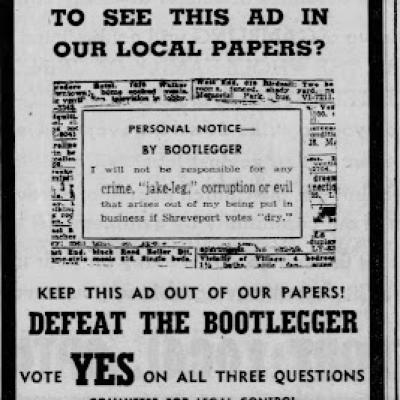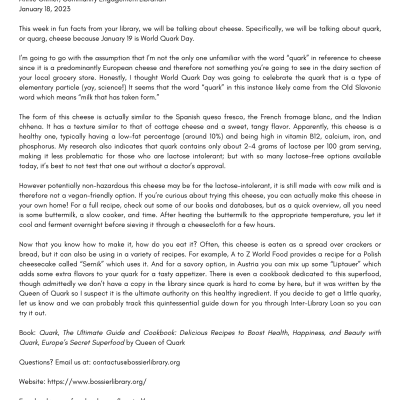
The Last Cotton Compress, and the Dying Art of “Calling the Press”
Not too long ago, while cleaning out the home of my mother-in-law in Coushatta, my husband Rick found an unusually titled LP record, “Cornbread for your Husband, Biscuits for your Man: Mr. Clifford Blake Sr. Calls the Cotton Press” (1980) and an accompanying report by folklorist Donald W. Hatley. My mother-in-law was a fan of the annual Louisiana Folk Festival at Northwestern State University in Natchitoches, put on by NSU’s Louisiana Folklife Center, which also published the above materials. Now they are a part of our History Center collection, and I was on a mission to find out what a cot... Read Full Blog

May Day - A Spring Diversion of Blossoms and Pageantry in 19th-Century Bossier
With a timeline spanning centuries, and geographically stretching around the northern hemisphere, the holiday of May Day, celebrated on May first to revel in the arrival of spring, has had different meanings across time and place. Many traditions, however, such as dances around a maypole, crowning a May queen and gathering flowers for decorating and bestowing on friends and neighbors, remained remarkably consistent across centuries and oceans. This week’s column examines local May Day celebrations of post-bellum nineteenth century. Twentieth-century celebrations will follow next week.
... Read Full Blog
Looking at Earth (Day) with a View from the Moon
Earth Day, a celebration of clean air, land, and water, is coming up on Saturday, April 22nd. Earth Day began in 1970 as part of a newly-developing environmental movement. But did you know, the environmental movement really took off, so to speak, far away from the Earth, with the Apollo space missions?
The Apollo missions, which began in 1961 and concluded in 1972, resulted in inspiring photographic images of our startlingly blue orb of a planet set in stark contrast to the blackness of space. These included the first photo of the Earth taken from space by a human. It became known... Read Full Blog

Billie Stevens: Wonder Librarian
It’s Women’s History month, and a perfect time to look back in our history and share the story of Bossier Parish Libraries’ very own Wonder Woman. Imagine a job ad like this, in the 1950’s: Wanted for Bossier Parish Libraries, a hard worker to perform the following duties: Put buckets under leaks, cut the tops off of large cans and nail them to cover holes in the floor, order books for all the schools in the Parish (in addition to all the public library books), take the bookmobile on unpaved roads to Rocky Mount or Chalybeate Springs, Red Land, Walker’s Chapel, or Mott, get that book mobile... Read Full Blog

Julia Sparke Rule: Nineteenth Century Media Maven and Mother
March is Women’s history month and it’s always a delight to find women from local history who challenged conventions, achieved something out-of-the-ordinary, or used whatever gifts and opportunities they had for the good of their community. It never ceases to amaze me the women like this that you can find when you look. One such woman is Mrs. Julia Rule, who became nationally famous for driving the golden spike in Bossier City, La. to mark the completion of the Shreveport and Arkansas Railroad on April 6, 1888 (later known as the Cotton Belt), and was well-known locally for her role working... Read Full Blog

Reconstruction: A Constitutional History
The last two weeks, I introduced readers to Henry Adams, an advocate for the rights, welfare, and livelihoods of his fellow freed men in Louisiana and nearby states following the Civil War, the U.S. historical time period referred to as “Reconstruction.” In restoring the union of the states in the war’s aftermath, what, exactly, was being “reconstructed”? Federal and State constitutions hold a significant part of that answer.
The 13th, 14th, and 15th amendments (changes and additions) to the United States Constitution are sometimes called the “Reconstruction Amendments.” They were... Read Full Blog

Part 2 Henry Adams and Resisting Intimidation: Black History Month 2023
It’s Black History Month and this year’s theme, from the Association for the Study of African American Life and History (ASALH), is “Black Resistance.” This is Part 2 of last week’s column about the Shreveport and Bossier-area freedman Henry Adams, whom the ASALH upholds as an example of Black Resistance. The ASALH highlighted that Adams (and Benjamin “Pap” Singleton) led a mass exodus westward of Southern Blacks in the Reconstruction period following the U.S. Civil War. The ASALH credited Bishop Henry McNeal Turner of the African Methodist Episcopal Church with organizing an emigration of ... Read Full Blog

The Origin of Mardi Gras (2-15-2023)
Mardi Gras, or Fat Tuesday, is upon us! Now, most of us are aware of the origin of Mardi Gras in this state and it’s association with Catholicism and Lent, but did you know that other countries have their own version of this pre-Lent celebration? And it’s not on Tuesday at all!
Apparently in Poland, Fat Thursday, or Tlusty Czwarkek, is celebrated on the Thursday preceding Ash Wednesday. It is also commonly called Paczki Day due to the tradition of consuming paczki during this celebration. Paczki are a Polish pastry, similar to jelly-filled donuts, which are typically filled with p... Read Full Blog

Black History Month and its Early Days Bossier (History Ctr Column)
Why is Black History Month celebrated in February and not some other month, such as January, the month of Martin Luther King Jr. Day? Because February has the birthdays of Abraham Lincoln and Frederick Douglass and Black History Month began before MLK Jr. was even born. This special recognition of Black history was begun by Dr. Carter G. Woodson (1875 – 1950), a Harvard-trained historian whose parents had been enslaved. Dr. Woodson believed black people had a culture and tradition that scholars should investigate and artists should use as inspiration. He challenged all Americans to understa... Read Full Blog

National Freedom Day (Comm Eng Column)
It’s officially February…or it will be within a few days, depending on when you read this. That means that Black History Month has kicked off, and it starts with National Freedom Day!
I’m not sure if this holiday is a familiar one to any of my readers, it’s only vaguely familiar to me since it doesn’t get printed into any of the calendars or planners I’ve purchased over the years, but it seems like an important one to celebrate. It’s one of the few official holidays I’ve written about in recent memory, and with its reminders of our history and its celebration of freedom, shouldn’t... Read Full Blog

The Dreaded Jake-Leg and Prohibition (History Ctr Column)
In the United States from 1920 to 1933, a nationwide constitutional law, the Eighteenth Amendment, prohibited the manufacture, sale and transportation of intoxicating beverages. It did not outlaw the possession or consumption of alcohol. The Volstead Act, the federal law that provided for the enforcement of Prohibition, had enough loopholes and weaknesses to open the door to countless schemes to evade the “dry” mandate. Several of these schemes flourished in the backwoods, fields and even towns of Bossier Parish and northwest Louisiana. Reports in the local newspapers show that Bossier Pari... Read Full Blog

Hey Knitting Enthusiants! (BPT Column)
The dates don’t necessarily work out to allow for celebrating this next random holiday on the actual date it falls on, but I can’t resist writing about it anyway because it’s tangentially related to knitting which is one of my hobbies. So, without further ado: it seems that since 2008, January 8th has been celebrated as National Argyle Day…at least in Scotland. And why not celebrate it here too?
Argyle, the pattern, is derived from the tartan of Clan Campbell of Argyll in western Scotland. This pattern consists of diamonds in alternating colors, typically only 2 color but nowadays... Read Full Blog

The History of Braille (BPT Column)
Happy New Year! Let me first start by hoping that everyone is experiencing an excellent start 2023. And now on to the first library column of the new year, which is all about the history of Braille in honor of World Braille Day on January 4.
World Braille Day is celebrated every year on January 4 because that day is the birthday of its inventor, Louis Braille. Louis Braille, a Frenchman, lost his sight as a child after an accident with an awl. He was sent to be educated at the Royal Institute for the Blind Youth in France when he was 10; this is where he developed his writing syst... Read Full Blog
